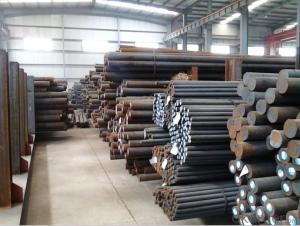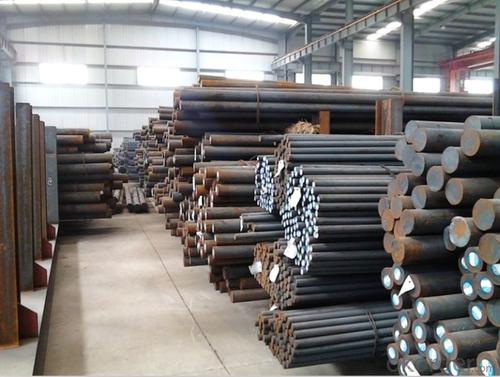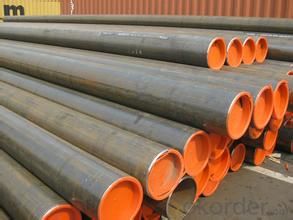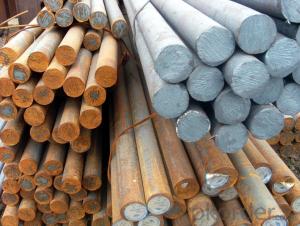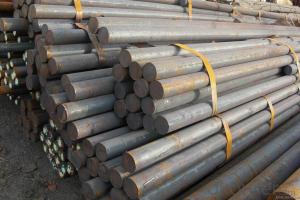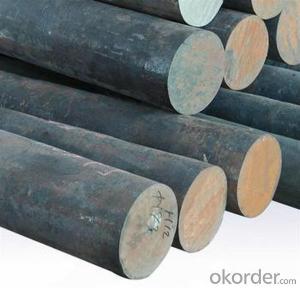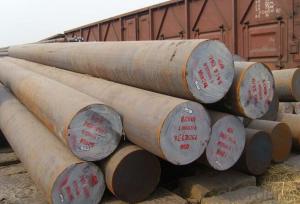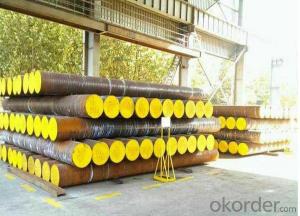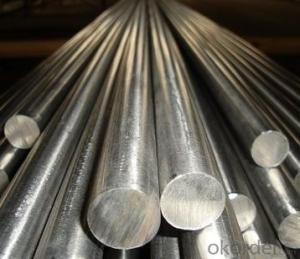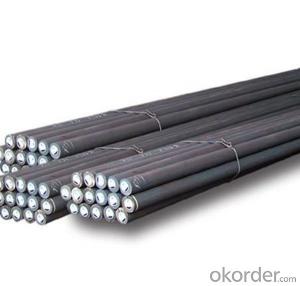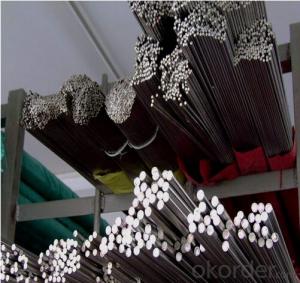Alloy Steel 4Cr13 Special Steel Carbon Steel
- Loading Port:
- China main port
- Payment Terms:
- TT OR LC
- Min Order Qty:
- 25 m.t.
- Supply Capability:
- 10000 m.t./month
OKorder Service Pledge
OKorder Financial Service
You Might Also Like
Specification
Chemical Composition(GB)%
C | Si | Mn | Cr | P | S |
0.4 | 0.5 | 0.7 | 13 | ≤0.030 | ≤0.030 |
Standard
GB | ASTM | DIN | JIS |
4Cr13 | 4.2 | 1.2083 | 420J2 |
Available Size
Rolled plate | 12-120mm*720mm*6000mm | ||
Module | 130-400mm*1000mm*6000mm | ||
Heat Treatment
Processing | Temperature ℃ | Hardness |
Anneal | 750-800 | ≤235HB |
Quenching | 1050-1100 | ≥50HRC |
Tempering | 200-300 | ≥50HRC |
Characterstics
1.High corrosion resistance and mirror performance
2.Higher strength and abrasion resistance
Applications:Suitable for precise dies with super mirror performance and abrasion resistance,camera components,optical lens


1, Your advantages?
professional products inquiry, products knowledge train (for agents), smooth goods delivery, excellent customer solution proposale
2, Test & Certificate?
SGS test is available, customer inspection before shipping is welcome, third party inspection is no problem
3, Payment Terms?
30% TT as deposit and 70% before delivery.
Irrevocable L/C at sight.
4, Trading Terms?
EXW, FOB, CIF, FFR, CNF
6, After-sale Service?
We provides the services and support you need for every step of our cooperation. We're the business partner you can trust.
For any problem, please kindly contact us at any your convenient time.
We'll reply you in our first priority within 24 hours.
- Q: How does stainless steel contribute to the automotive industry?
- Stainless steel contributes to the automotive industry by providing strength, durability, and corrosion resistance in various automotive components such as exhaust systems, body panels, and engine parts. Its ability to withstand extreme temperatures and harsh conditions make it a preferred material for manufacturing high-performance vehicles. Additionally, stainless steel's aesthetic appeal and low maintenance requirements make it suitable for decorative purposes in car interiors and exteriors.
- Q: How does special steel contribute to the strength of products?
- Special steel contributes to the strength of products in several ways. Firstly, special steel is engineered to have enhanced mechanical properties, such as high tensile strength, toughness, and hardness. This makes it ideal for applications where strength is crucial, such as in the construction industry, automotive manufacturing, and aerospace engineering. Moreover, special steel can be customized to meet specific requirements, allowing manufacturers to tailor the material's composition and properties to suit their products. This flexibility ensures that the steel used in various components is optimized for maximum strength, durability, and performance. Additionally, special steel undergoes various heat treatment processes, such as quenching and tempering, which further enhance its strength. These processes modify the microstructure of the steel, resulting in improved hardness and resistance to wear and fatigue. As a result, products made from special steel can withstand heavy loads, harsh environments, and repetitive stress, ensuring their long-term reliability and longevity. Furthermore, special steel often exhibits excellent corrosion resistance, making it suitable for applications exposed to corrosive environments, such as marine or chemical industries. By preventing the degradation of the material, corrosion resistance contributes to the overall strength and lifespan of the product. In summary, special steel greatly contributes to the strength of products by providing enhanced mechanical properties, customized composition, heat treatment processes, and corrosion resistance. These factors combine to ensure that products made from special steel can withstand high stresses, extreme conditions, and offer exceptional performance, making them indispensable in various industries.
- Q: What are the main factors affecting the corrosion resistance of special steel?
- There are several main factors that can affect the corrosion resistance of special steel. Firstly, the composition of the steel plays a crucial role in determining its corrosion resistance. Special steels are typically alloyed with elements such as chromium, nickel, and molybdenum, which form a protective oxide layer on the surface of the steel. This layer acts as a barrier against corrosive substances, preventing them from reaching the underlying steel and causing corrosion. The higher the percentage of these alloying elements, the better the corrosion resistance of the steel. Secondly, the presence of impurities or contaminants in the steel can greatly affect its corrosion resistance. Any impurities or contaminants, such as sulfur or phosphorous, can compromise the protective oxide layer and make the steel more susceptible to corrosion. Therefore, the purity of the steel, as well as the manufacturing process used, is important in ensuring good corrosion resistance. Thirdly, the surface finish of the steel can also impact its corrosion resistance. A smooth and polished surface can help reduce the likelihood of corrosion, as it minimizes the areas where corrosive substances can accumulate and penetrate the steel. Additionally, surface treatments such as passivation or coating can further enhance the corrosion resistance of special steel. Furthermore, the environment in which the steel is exposed to is another critical factor. Different environments have varying levels of corrosive substances, such as moisture, acids, or salts, which can accelerate the corrosion process. For instance, marine environments with high salt content are particularly corrosive, requiring special steel grades that offer superior resistance to such conditions. Lastly, the temperature at which the steel operates can influence its corrosion resistance. Some special steels, such as stainless steel, exhibit excellent corrosion resistance at elevated temperatures, making them suitable for high-temperature applications where other materials may corrode. In summary, the main factors affecting the corrosion resistance of special steel include its composition, the presence of impurities, the surface finish, the environment it is exposed to, and the operating temperature. By considering these factors and selecting the appropriate steel grade, one can ensure optimal corrosion resistance for specific applications.
- Q: What are the different methods of surface thermal spraying for special steel?
- There are several different methods of surface thermal spraying for special steel, including flame spraying, arc spraying, plasma spraying, and high-velocity oxy-fuel (HVOF) spraying. Each method involves heating and melting a coating material, which is then propelled onto the steel surface to form a protective layer. These methods offer varying levels of coating thickness, adhesion, and durability, depending on the specific requirements of the application.
- Q: How does special steel contribute to the telecommunications equipment industry?
- Special steel plays a crucial role in the telecommunications equipment industry by providing high-quality materials that ensure the durability, functionality, and performance of various components. It is used in manufacturing transmission towers, antenna mounts, cables, connectors, and other critical infrastructure. The strength, corrosion resistance, and electrical conductivity of special steel enable the reliable transmission of signals, support the weight of equipment, and protect against external factors such as weather conditions. Overall, special steel contributes to the efficiency and reliability of telecommunications equipment, ensuring seamless connectivity and communication.
- Q: How does special steel perform in low-temperature environments?
- Special steel performs exceptionally well in low-temperature environments. It exhibits excellent toughness, high strength, and remarkable resistance to brittle fracture, which makes it suitable for various applications in extreme cold conditions. Additionally, special steel maintains its mechanical properties even at sub-zero temperatures, ensuring reliability and durability in challenging environments.
- Q: What is the significance of special steel in the medical field?
- Special steel, which is also referred to as medical grade steel, holds a vital role in the medical field due to its distinct properties and importance. Specifically designed and produced to meet the strict requirements of the healthcare industry, special steel's significance in the medical field can be grasped through the following points: 1. Biocompatibility: Special steel demonstrates biocompatibility, meaning it is non-toxic and does not elicit an adverse reaction when it comes into contact with the human body. This makes it an ideal material for medical devices like surgical instruments, implants, and orthopedic tools. 2. Resistance to corrosion: Special steel exhibits high resistance to corrosion and rust, ensuring the endurance and durability of medical instruments. Instruments used in surgical procedures require repeated sterilization, and the corrosive nature of sterilization agents can degrade ordinary steel. Special steel, with its superior resistance to corrosion, can withstand these harsh conditions, decreasing the risk of contamination and preserving the integrity of medical equipment. 3. Mechanical properties: Special steel possesses exceptional mechanical properties, such as high strength, toughness, and ductility. These characteristics are crucial for medical devices as they need to endure the stresses and strains of surgical procedures, maintain their shape, and deliver reliable performance. 4. Compatibility with sterilization: Special steel can withstand various sterilization methods, including steam sterilization, ethylene oxide sterilization, and gamma radiation. This guarantees that medical instruments made from special steel can be effectively sterilized, preventing the transmission of infections and minimizing the risk of contamination during surgeries. 5. Precision manufacturing: Special steel can be shaped into intricate forms and sizes, enabling the production of precise medical instruments. Its superior machinability allows for the creation of fine and sharp edges, which are vital for surgical tools used in delicate procedures. 6. Antibacterial properties: Certain special steels, such as stainless steel, possess inherent antibacterial properties. This characteristic is particularly crucial in the medical field, where preventing infections is of utmost importance. Instruments made from antibacterial special steel can hinder the growth of bacteria, minimizing the risk of post-operative complications. In conclusion, the significance of special steel in the medical field lies in its biocompatibility, resistance to corrosion, mechanical properties, compatibility with sterilization, precision manufacturing, and potential antibacterial properties. These qualities render special steel an indispensable material for the manufacturing of medical devices, ensuring their dependability, durability, and safety for both healthcare professionals and patients.
- Q: How is special steel used in the power generation industry?
- Special steel is used in the power generation industry for various applications such as turbine blades, generator rotors, and boiler components. These steels possess exceptional strength, corrosion resistance, and heat resistance properties, making them suitable for withstanding high temperatures and pressures in power plants. They help improve the efficiency and reliability of power generation equipment, ensuring safe and uninterrupted electricity production.
- Q: What are the specific requirements for special steel used in the chemical reactor industry?
- The specific requirements for special steel used in the chemical reactor industry can vary depending on the specific application and the type of chemicals being processed. However, there are some general requirements that are typically expected for this type of steel. Firstly, the steel used in chemical reactors must have excellent corrosion resistance. Chemical reactors often handle highly corrosive substances, such as acids, alkalis, and other reactive chemicals. Therefore, the steel must be resistant to the corrosive effects of these substances to ensure the integrity and durability of the reactor. Secondly, the steel should have high temperature resistance. Chemical reactions often require high temperatures to facilitate the desired chemical transformations. The steel used in these reactors must be able to withstand these elevated temperatures without losing its structural integrity or undergoing any significant deformation. Furthermore, the steel should have good mechanical properties, including high strength and toughness. The reactor may experience high pressure and mechanical stress during operation, so the steel must be able to withstand these conditions without failure. Additionally, the steel used in chemical reactors should have good weldability and formability. This allows for ease of fabrication and construction of the reactor, ensuring a reliable and efficient manufacturing process. Moreover, the steel should have low levels of impurities, such as sulfur and phosphorus. These impurities can adversely affect the performance of the steel in terms of corrosion resistance and mechanical properties. Therefore, the steel must meet strict quality standards to ensure it is suitable for use in the chemical reactor industry. In summary, the specific requirements for special steel used in the chemical reactor industry include excellent corrosion resistance, high temperature resistance, good mechanical properties, weldability, formability, and low levels of impurities. Meeting these requirements is crucial to ensure the safety, reliability, and efficiency of chemical reactors in various industrial processes.
- Q: What are the properties of duplex stainless steel?
- Duplex stainless steel is a type of stainless steel that possesses a unique combination of properties. It is highly corrosion resistant, making it suitable for use in aggressive environments, such as those containing chlorides or acids. It also exhibits excellent strength and toughness, allowing it to withstand high pressures and temperatures. Additionally, duplex stainless steel has good weldability and formability, making it versatile for various fabrication processes. Its dual-phase microstructure provides a balance of ferrite and austenite, resulting in improved resistance to stress corrosion cracking and higher resistance to pitting and crevice corrosion compared to other types of stainless steel.
Send your message to us
Alloy Steel 4Cr13 Special Steel Carbon Steel
- Loading Port:
- China main port
- Payment Terms:
- TT OR LC
- Min Order Qty:
- 25 m.t.
- Supply Capability:
- 10000 m.t./month
OKorder Service Pledge
OKorder Financial Service
Similar products
Hot products
Hot Searches
Related keywords
